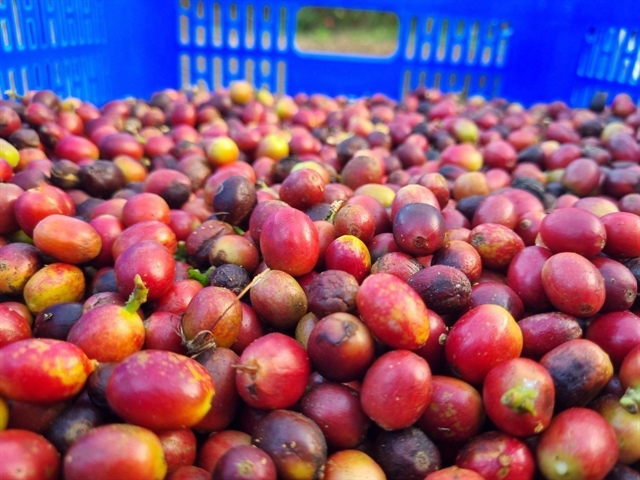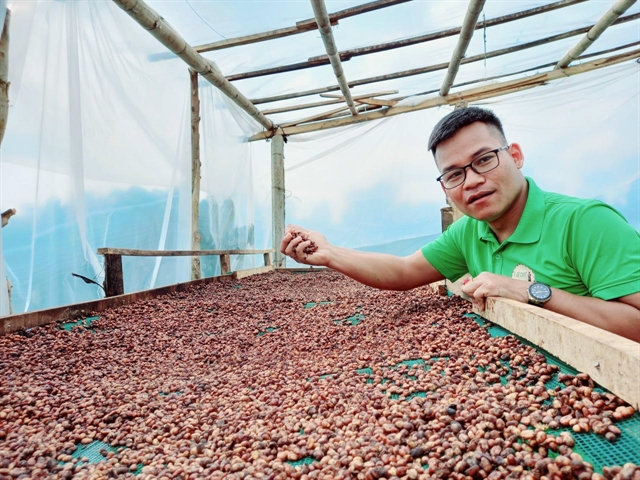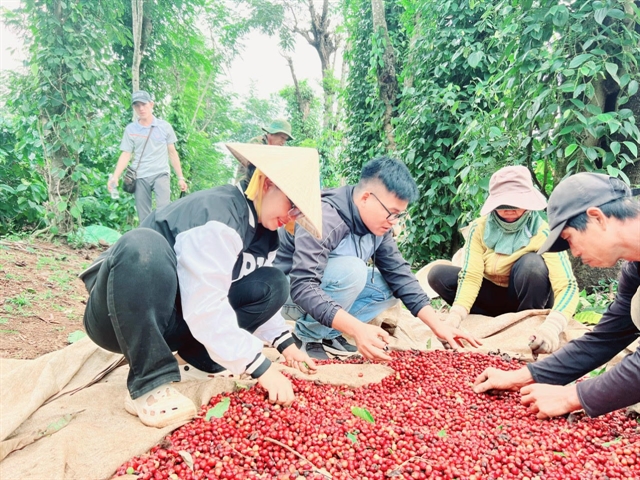 Economy
Economy

 |
| Y Pôt Niê at a farm in Dray Sáp Commune, Krông Ana District in the Central Highlands province of Đắk Lắk. — Photo courtesy of Y Pôt Niê |
Tố Như
CENTRAL HIGHLANDS — Y Pôt Niê, 36, an Ê Đê ethnic man, stands at his booth at the eighth National Farmers Forum, taking place in Hà Nội, and inviting visitors to try a cup of his coffee.
Niê, director of Ê Đê Café Joint Stock Company, was honoured as one of 100 outstanding Vietnamese farmers at the forum.
He said the Robusta coffee product of his company was recognised with four stars under the One Commune, One Product (OCOP) programme since 2022.
After five years of operation, his company has provided full-time jobs for 30 local people with a salary of VNĐ5-7 million (US$204-286) per month, as well as more than 100 part-time jobs.
Niê said that he was born and raised in Kla Village, Dray Sáp Commune, Krông Ana District in the Central Highlands province of Đắk Lắk, the land of coffee trees.
“Coffee trees have been associated with my life since I was a child,” he said.
That was also the reason why, even though he spent six years studying at Đà Nẵng College of Medical and Pharmacy and then worked at the Military Hospital 175 after graduation, he still decided to return to his hometown to found a start-up planting coffee trees.
“I want to improve the value of coffee beans produced by local people,” he said.
At first, he learned and practised the traditional coffee roasting and grinding methods of the Ê Đê ethnic people, and then he sent them to his friends to try.
“The roasting process determines the flavour of coffee,” he said.
According to him, during the roasting process, the fire must be kept steady and low to maintain the natural flavour of the coffee fruit.
“This is a coffee roasting recipe that I inherited from the ancestors. The smell of smoke mixed with the smell of coffee will create a special flavour for the coffee products," he said.
He also introduced his products for sale on social networking sites.
Unexpectedly, the products were very broadly welcomed.
In 2019, he established his company.
‘Every beginning is difficult’
 |
| Y Pôt Niê (second, left) checks coffee beans with local farmers in Dray Sáp Commune, Krông Ana District in the Central Highlands province of Đắk Lắk. — Photo courtesy of Y Pôt Niê |
When he started his business, he also faced opposition from his family. His family wanted him to continue working in the health sector.
"They did not want me to quit my job with a stable income for a start-up and meet with numerous difficulties and challenges," he said.
In the meantime, local farmers did not believe in the organic farming method that he pursued.
Most local farmers followed popular methods, using pesticides and chemical fertilisers, he said.
Thus, changing their farming habits towards organic practices was not easy, he added.
But he was never discouraged. He spent both money and time to promote his coffee products at fairs and exhibitions.
In addition, he also improved his English to approach customers and promote his coffee products on foreign trading floors.
Step by step, his brand gradually gained a foothold in the market. The villagers no longer doubted his direction but volunteered to cooperate to form an organic coffee processing area, without using chemical fertilisers or pesticides.
His company has linked with 50 local households in the village to expand the raw material area to more than 100ha of Robusta coffee so far.
In addition, the company has planned to coordinate with other communes in the district to expand the coverage of about 1,000ha of coffee trees.
“Farming following the organic method helps to increase the price of the coffee products,” he said.
The price of coffee products of his company, purchased by businesses, was usually 10-50 per cent higher than regular coffee products, he added.
From two coffee products originally, his company now has eight product lines with two forms of powdered coffee and instant coffee.
His coffee products have been exported to the Netherlands, Singapore, Malaysia and Mongolia, and have reached 56 out of 63 provinces and cities nationwide so far. — VNS




